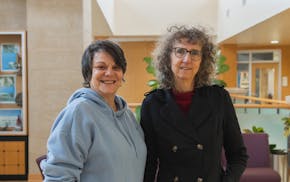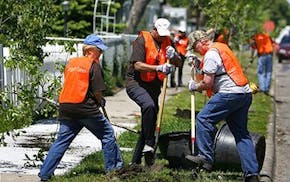Erin Walsh has switched sides.
She was in high school when her psychologist dad, David Walsh, founder of the National Institute on Media and the Family, railed against violent video games aimed at kids. (The Minneapolis nonprofit closed in 2009.)
At the time, all she wanted to do was play the video games her friends were playing — the same ones her dad was admonishing people against.
Now, the 36-year-old mother works alongside her dad, helping parents raise children who will thrive in the age of digital media.
Through their organization, the Minneapolis-based Mind Positive Parenting, the Walshes digest the latest research on child and adolescent brains and use it to develop useful parenting tips. They also keep track of the ever evolving media landscape, which helps parents better understand their kids' real and virtual worlds.
We talked with Erin about our relationship with technology, electronic spying, kindness and the teenage brain.
Q: Did you intend to follow in your father's footsteps?
A: No. But as I got older and started looking at the world around me, I realized what a powerful role that screens and technology were having on my generation and on the generations after me. So I returned to my dad in my early 20s and said, "You know, you're onto something." We've actually been working together off and on ever since.
Q: What's your division of labor?
A: My dad is a trained psychologist. And I'm trained in the social sciences — sociology and human geography. He brings the clinical lens; I bring the social lens, and we meet in the middle.
Q: What do parents struggle with the most?
A: We are all trying to figure out what's our relationship with these devices, when they're helping us live the kind of lives we want to live and when they're hurting us.
It's very confusing and really scary for parents to try to navigate how much is too much. If you do a deep dive in the research, it's clear that there are some reasons to be concerned and some real strengths. Technology is not inherently bad.
Q: What practical advice do you have to help parents protect their kids while allowing them to reap the benefits of social media?
A: Have conversations about technology use early and often. Also, talk to them early and often about kindness and caring. There are human beings on the other end of these devices who have feelings. So it's tethering our virtual worlds to our real emotional lives.
For little ones, it's OK to keep that playground really small and to be monitoring their digital use. But there is no app or monitoring software that can replace our dialoguing with our kids.
Q: Should parents use monitoring software to spy on their kids?
A: It's OK as long as you tell your kids that you're doing it. The goal is not to catch them being bad, but to encourage good behavior. Once they've earned your trust, you can loosen the reins a bit.
But if you see some red flags as you're spot-checking their online lives, then you need to reel them back in.
Q: Anything else?
A: The other thing you can do is to set good, old-fashioned boundaries. One of the approaches I've taken is to create screen-free family times and hold to those.
Bedtime is a sacred space; so is family meal time and study time. If we can create some family norms and boundaries around those times, we create great protective factors for kids.
Q: How is the teenage brain unique?
A: We used to think the brain was a finished product around age 12. It turns out that the brain continues to grow and develop. Most people now understand that the teenage brain is still under construction.
One of the things we talk about in our workshops is whatever the brain does a lot of is what the brain gets good at — especially while it's under construction.
The teenage years are an incredible time of learning and growth. We need to provide young people with the right training grounds to develop the skills they'll need to negotiate life.

Yuen: Why do people forgive? It's messy, complex and 'the best form of self-interest'
How the Goo Goo Dolls learned the music biz from Minneapolis bands
